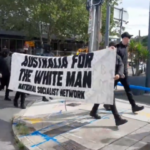NSW Police Officer Questions Driver Over “Antisemitic” Watermelon in Car

Over the last week, a short videoclip of a NSW police officer has gone viral across the planet, as the handlebar moustachioed cop is seen to confront the driver of a car in respect of what he considers could potentially be an antisemitic watermelon inside of it.
“In that car,” says the officer, as he points in the direction of the stationary vehicle, “there are material that appears to be antisemitic.”
The driver, who’s filming, then asks, “What’s the antisemitic material?” And the officer replies, “Well, there’s a small watermelon.” Then the clip cuts out.
The exchange between the NSW police officer and the civilian is made all the more absurd, as the viewer can see the ridiculousness of the officer’s statements regarding a watermelon image translating as an act of Jewish hate dawn upon him, and he blushes with embarrassment.
The watermelon has long been a clandestine way to symbolise Palestine and the Palestinian cause as the different parts of the fruit hold the same colours – red, green and black – as does the Palestinian flag, which has been prohibited in the Palestinian territory at various times by Israel since the 1960s.
The watermelon and the officer have been caught up in an attempt by Australian authorities since October 2023, to frame all support for the Palestinian people and the rejection of Israel’s genocidal assault upon Gaza, as somehow translating as antisemitism or prejudice towards Jewish people.
And while the form the offending watermelon in the car took is unclear, the officer did indicate with his fingers that the suspect item was about five centimetres long, so it was likely not real fruit.
Yet, what is clear is that at some point early on during the Gaza genocide, this state’s authorities lost all bearings.
A criminal conflation
Following the onset of the Israeli perpetrated Gaza genocide in early October last year, old tropes that have served to shield the Israeli state and it’s settler colonial project from international criticism going back decades, have now been propagated within the local public sphere like never before.
As the Jewish Council’s Sarah Swartz told Sydney Criminal Lawyers in March, over the years, the Israel Lobby has been asserting a conflation of two behaviours – prejudice towards Jewish people and political criticism of the Israeli state – so that both can be perceived as antisemitic.
Antisemitism has been an issue in Europe for centuries, and this culminated in World War II, when Nazi Germany carried out a genocide upon the Jewish people of Europe, which systematically killed over 6 million people.
One of the outcomes of the Holocaust, as it is known, is that the charge of acting in an antisemitic manner has been formidable ever since.
But as US gender studies scholar Judith Butler set out during a forum in Paris in March, it wasn’t until the early 1970s that anti-Israel sentiment was conflated with antisemitism.
“Before the 1970s, you could have whatever view on Israel that you might have,” they explained, “and it was a political disagreement.” They further explained that in the 1970s, a group representing Israel locally and in the diaspora began conflating antisemitism with anti-Zionism.
The nation of Israel was established on Palestinian country in 1948, in what was a violent landgrab. And underpinning this settler colonial project is the 19th century theory of Zionism, which involves what is portrayed as a god-given right of Jewish peoples to create a homeland upon Palestinian soil.
So, in this manner, Zionist and pro-Israel forces have taken advantage of the weight the horrors of the Holocaust have lent the charge of antisemitism and used it to deflect criticism of Israel, so that it blocks charges of apartheid, genocide and settler colonialism carried out against the Palestinians.
Countering atrocities is prejudicial
The wholesale massacre in Gaza is spilling over into its 15th month. The official death toll is nearing 45,000 Palestinians, however there are likely tens of thousands more people who’ve been killed. And the charge of antisemitism has been used to stifle criticism of the Israeli-perpetrated genocide.
The rush to demonise criticism of Israel since it began the mass slaughter of the Palestinians of Gaza has been apparent in the west, as pro-Palestinian demonstrators have been charged as antisemitic, while the US lower house passed a motion in May recognising anti-Zionism as antisemitism.
Since the beginning of the Gaza genocide, there has been a huge upswell of grassroots support for the Palestinian people in this country, which, because of the establishment’s support for Tel Aviv, has been demonised as antisemitic, despite the fact that people are calling for the end to a genocide.
In April, Sydney University students kicked off a wave of Gaza solidarity encampments at universities across the country. However, these demonstrations were too labelled as antisemitic to the point that a parliamentary inquiry into Jewish hate at universities was held.
So, while Israel has been mass murdering the population of Gaza, which has bled out into the West Bank and then been directed at Lebanon over more recent months, Australia has been doing its utmost to crack down on a supposed spike in antisemitism, with the real focus being on anti-Zionism.
The issue here is that while the local Palestine movement has strong Jewish support within its ranks from those who reject the Zionist project, key politicians have been focused on its actions, while an accompanying rise in neo-Nazism, with its history of antisemitism, had been left unchecked.
Indeed, it wasn’t until recently that Victorian authorities took aim at growing neo-Nazi mobilisations, which have historically posed the greatest antisemitic threat both here and elsewhere.
Is that a watermelon in your pocket?
So, while the NSW police officer’s appearance all over social media last weekend caused a great outburst of ridicule over just how absurd the current political climate has become in this state, the truth is that the ridiculousness of the episode is too matched by its seriousness.
The questions the incident raises include whether NSW police has been discussing the need to combat antisemitism and if this conversation includes discussions about the threat of fruit, as well as just how Constable Watermelon himself came to discern the problem with the car.
The issue with this incident is that unlike the officer in the footage who realised the folly of the situation he’d led himself into, and it seemed apparent that he was just about to back track out of it, there are some NSW police officers out there that don’t like to back down.
And if Constable Watermelon wasn’t the type of officer who could recognise the inanity of his own behaviour but was rather the type that doesn’t have it in them to admit they’re wrong, well, that’s when having armed officers with bizarre ideas circling around about fruit, could get dangerous.







